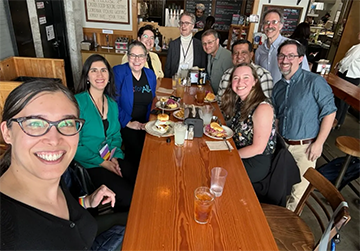
Four years ago, AccessComputing co-PI Amy Ko, along with other SIGCSE convention-goers, arrived in Portland to the news that the conference had been canceled, as the COVID-19 pandemic changed everything nearly overnight. Last month, SIGCSE returned to Portland and Amy noted how much, including herself, had changed in those four years. On both trips to Portland (her hometown), Amy took the same train and walked into the same hotel lobby. But she’s changed in those four years; far more engaged in equity and access work rather than adhering to a strict focus on presenting research papers. Over the course of the conference, Amy noted ways in which SIGCSE, and computing, have changed too.
Quite a few AccessComputing-affiliated people attended SIGCSE this year and accessibility content featured in many sessions and workshops, including some led by AccessComputing leadership and partners. In addition, accessibility was featured in two best paper awards:
- Beyond HCI: The Need for Accessibility Across the CS Curriculum" was written by AccessComputing partners Yasmine Elglaly (Western Washington University), Catherine Baker (Creighton University), Anne Ross (Bucknell University), and Kristen Shinohara (Rochester Institute of Technology).
- "Accessible to Whom? Bringing Accessibility to Blocks" was led by AccessComputing partner and AccessCSforAll PI, Andreas Stefik (University of Nevada at Las Vegas).
AccessComputing is also a participant in the National Science Foundation & Computing Research Association (CRA) LEVEL UP initiative, which brings together a number of the NSF’s Broadening Participation in Computing alliances and other entities to increase diversity in computing fields. LEVEL UP had held a series of regional workshops over the last year, sharing strategies and evidence-based practices for broadening participation, hosting their last workshop at SIGCSE in Portland last month. As an AccessComputing co-PI, Brianna Blaser sits on the LEVEL UP leadership team and led the breakout session “Making Departments and Programs More Accessible for Students with Disabilities.”
Thursday afternoon, the AccessComputing-organized Birds of a Feather (BoF) session on disability attracted more than 60 participants. The range of topics discussed at the BoF included discussions about the impact and accessibility of AI, teaching accessibility concepts in K-12 computing science courses and accessible programmable media. Amy noted that this too was a change; a refreshing one, as they “used to attract people with only general questions about disability, but conversations have moved beyond to the concrete issues of making more accessible computing.”
On Friday evening, AccessComputing hosted a social; team members, leaders, and partners were joined by numerous other friends and colleagues from the University of Washington and beyond to have what Amy called a “semi-public” social at Lil’ America’s Food Trucks, one of Portland’s iconic diverse and inclusive Food Cart Pods near the conference center.
All-in-all, with variety of accessibility-related sessions, papers, posters, and workshops, SIGCSE 2024 demonstrated that the topic of accessibility has become an important part of the conversation regarding not only computing education, but the responsibility of computing professions to ensure accessibility in software and other products, as technology increasingly impacts everyday life. Broadening Participation in Computing initiatives like AccessComputing and the visibility of people with disabilities in computing have had a major impact in creating that awareness.
You can read more about SIGCSE 2024 and get Amy Ko’s insightful take on the conference at her Medium journal, Bits and Behavior in: SIGCSE 2024 trip report: always hallways.